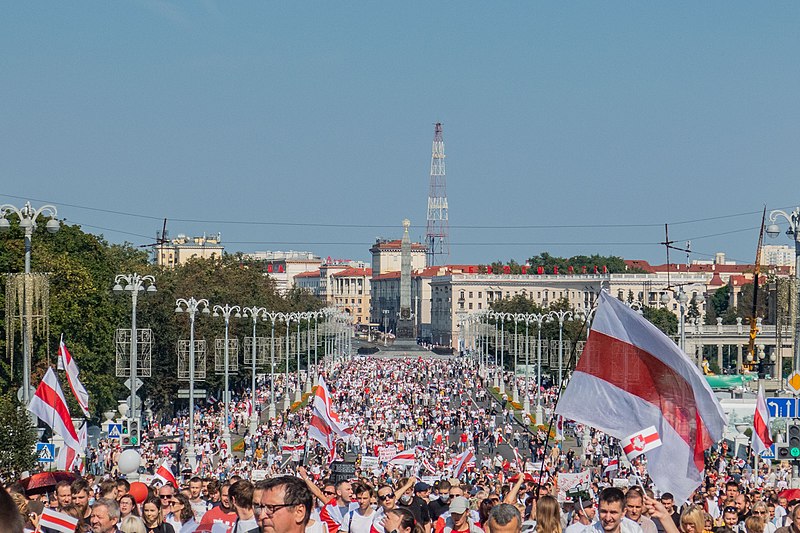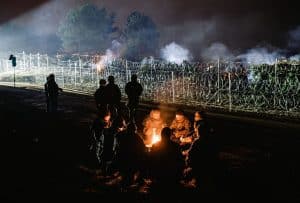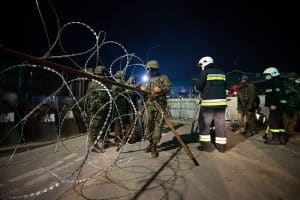Photo: Protests in the streets of Minsk after the rigged elections in 2020. Source: Google Images
“A senseless farce”, is how Belarusian opposition leader Sviatlana Tsikhanouskaya described the recent local and parliamentary elections in her country. Only parties that pledged their allegiance to dictator Lukashenka were allowed to partake, with the opposition in exile calling for a boycott. It was the first election since the highly contested 2020 presidential elections in which Lukashenka secured a sixth term in office. Then, mass demonstrations erupted across Belarus that were violently suppressed by the regime, with the help of Lukashenka’s close ally Putin. Ruthless repression and inhumane imprisonment of people and organizations suspected to oppose the regime has become routine since. Many dissidents have been forced abroad where they continue their struggle for a democratic Belarus. As Belarus is drawn further into Russia’s sphere of influence and the human rights situation continues to deteriorate, it is a crucial time to rally to the cause of a democratic Belarus.
2020 elections
As Belarus opened up economically and increasingly engaged in trade relations with the EU during the previous decade, many Belarusians hoped this would bring more political freedom in their country. “Improving EU-Belarus relations” and the election of two opposition figures in 2016 even prompted the EU to relieve sanctions on members of the Belarusian elite, including Lukashenka himself. In hindsight, but also considering critical reports by the UN and OSCE at that time, the EU’s optimism seems to have been premature. In the run-up to the 2020 elections it would become clear once again that any real attempts to oppose the regime were futile, as many Belarusian opposition candidates were denied to stand for election. Some were arrested and prosecuted, including prominent opposition leaders Syarhey Tsikhanouski (18 years) and Viktor Babariko (14 years), who remain in jail up to this day. Others had already fled the country due to intimidation and threats of persecution. Sviatlana Tsikhanouskaya would be the only opposition figure that was allowed to run.
Shortly after polls closed on August 9, unrest broke out in cities across Belarus. According to ‘official’ results, Lukashenko had secured more than 80 percent of the vote. Many analysts declared Sviatlana Tsikhanouskaya the real winner of the 2020 elections even though official results attributed here with just 9% of votes. Thousands took to the streets to protest the unfair election process and its questionable outcome. The response of the regime was swift and violent with clashes between protesters and police resulting in many wounded and several killed. More than 35.000 people would be arrested in the wake of the protests, many suffering torture and other forms of physical abuse while in custody.
Inhumane treatment political prisoners
After a renewed crackdown by the Lukashenka regime, that led to the imprisonment of more than 400 people in 2022, there are now nearly 1500 political prisoners in Belarus. The conditions in the penal colonies are known to be inhumane and very harsh. Especially for dissidents, who are forced to wear a distinctive yellow patch that singles them out from other prisoners. They face physical violence, are locked up in so-called ‘punishment cells’ for supposed violations of prison protocols and get additional jailtime as a result. Adequate medical care has often been very limited and has led to serious health problems and even death in some cases.
The case of Social Democratic Party member Ihar Lednik, who was jailed for three years for ‘insulting the country’s leader’, is emblematic for the reality that political prisoners in Belarus face. Lednik was known to have heart problems when he was convicted. His health quickly deteriorated and after less than two years he died as a result of cardiac arrest. He is the fifth person political prisoner in Belarus to die behind bars in 2023.
Support for Belarus
Although the post-election protests in 2020 showed the willingness of many Belarusians to risk their freedom and even their lives for democracy, the subsequent crackdown decimated the remaining domestic political opposition. Russia’s invasion of Ukraine ushered in a new wave of arrests that pushed the number of political prisoners to around 1500, although the actual number is likely much higher. The fate of many political prisoners remains unclear as authorities have shut off any contact with their relatives. It is crucial to continue reporting on the horrendous conditions they face and offer support to their relatives abroad.
Whereas before 2020 regime paranoia and repression mainly focused on political organisations, broader civil society has suffered severely since. One of the largest NGOs that was still active, BirdLife Belarus, was closed down in 2022 due to ‘extremist activities’ along with 300 other groups. Human rights activists have faced arrest, arbitrary detention, physical abuse and intimidation. Some courageous activists still work on the ground but the majority of civil society has been forced into exile. Families of those who fled abroad are targeted with extreme measures including trumped-up criminal charges and children being forced into state care. The regime also seeks to discredit those in exile through extensive propaganda campaigns.
There are many initiatives by Belarusians in exile, especially by youth and women’s groups, that need and deserve support. As Belarus becomes increasingly isolated it is vital to keep generating attention for the situation in Belarus and the plight of its people. The FMS works with several Belarusian partners and regularly reports on the situation there, read more about it here. Aiding and assisting Belarusian opposition and civil society is crucial for there will come a new time of opportunity. When that time comes, a new generation of politicians, activists and a well-developed civil society should be ready to pursue a democratic future for Belarus.



